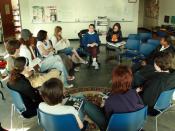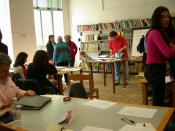Writing Processes
"Writing is far from being a simple matter of transcribing language into written symbols: it is a thinking process in its own right. [â¦] We believe that there is no point in pretending that writing is easy. Certain cognitive psychologists have described it as the most complex and demanding of all cognitive activities undertaken by human beings; because there are no rules" (White, 1991:3 & 12).
As shown in this quote writing is a very complex matter. We distinguish between two approaches to how to teach academic writing: the product school and the process school. In this essay I will analyse the key aspects of these two schools to determine which school should be used to improve university students' writing.
The product school can be defined as the following:
"In the teaching of writing we can focus on the product of writing or on the writing process itself.
When concentrating on the product we are only interested in the aim of a task and in the end product" (Harmer, 2001:257).
As opposed to the product school we find the process school:
"Those who advocate a process approach to writing, however, pay attention to the various stages that any piece of writing goes through. By spending time with learner on pre-writing phases, editing, redrafting, and finally "publishing" their work, a process approach aims to get tot he heart of the various skills that should be employed when writing" (Harmer, 2001:257).
"The goal of this approach is to nurture the skills with which writers work out their own solutions to the problems they set themselves, with which they shape their raw material into a coherent message, and with which they work towards an acceptable and appropriate form for expressing it (White, 1991, p. 5)
The first key aspect of the product school is writing is an activity that is done on one's own and in contrast to that the process school says, writing is a collaborative activity. In my opinion both assumptions are true in a university environment. For some courses a product approach is the only way writing takes place, for instance for most seminars I have done in my first language study, the writing of the seminar papers has always happened on my own, while I usually use a process approach when writing in a foreign language, since I let someone proof read my seminar papers and key points are discussed with other colleagues and friends before handing in the final draft. The process approach at this point is very helpful because people write and think differently and therefore a second or third opinion on own ideas can be very useful to make sure that the main aspects are clear and understandable to everyone. Harmer also says that "individual students also found themselves saying and writing things they might not have come up with on their own, and the groups' research was broader than an individual's normally was" (Harmer, 2001:260). White and Arendt write on this topic:
"A [â¦] challenging task which writers face is that they have to organise an amorphous mass of ideas, information and association into coherent, linear text. Moreover, they can neither speak to nor see the person or persons they are addressing. All they have to convey their message is the abstract symbol system of written language. With this, they must make explicit every aspect of their meaning; their text must create its own context." (White, 1991, p. 4)
The next key aspect for the product school is: writing skills can be taught, hence the use of sample texts as a means to explicitly teach, and analyse, content and structure (e.g. the 5-paragraph essay) with student mimicking text while for the process school the key aspect to that topic is writing skills are developed over time, without the aid of explicit instruction necessarily of how to construct an essay - the student is essentially left, partly at least, to discover for him/herself. On this key aspect I fully agree with the product approach, I am conviced, that it is easier for students to have strict rules for instance how the layout (font, quotations or line spacing) of an essay should look like, which language should be used in the different genres and how to construct different types of texts. Although I know from own experience that these rules are very helpful for students, I believe that these rules limit students in their creativity and are more a "knowledge-telling" than a "knowledge-transforming" model. In the former students do only need to reproduce "information that a teacher or textbook has previously organized and presented", whilst the latter of whom "a much richer cognitive activity [is] where writers construct new knowledge by combining what they know about the topic with their knowledge about discourse processes and goals" (Bruning, 2004:292).
The key aspect number three focuses on grammar. The product school holds the view that grammatical focus is a key part of product writing from the start. Whereas the process schools thinks that a focus on one's grammar is usually delayed until the editing style. From my personal experience I can say that I use both schools aspect on grammar when writing. I try to write grammatically correct from the start but I change and correct careless mistakes at the very end. I think that focusing too much on grammar could have a negative impact on the content of the written work, because students may focus too much on grammar and sentence structure and less on the content.
The product school's next key aspect is: an essay is a single-draft endeavour and in the contrary the process school says: essay writing involves multiple drafts. The most striking quote I found about this topic is a quote by Ernest Hemingway, an American author and journalist, who said "the first draft of anything is shit" (Otis, 2013). I usually write my essays with a product school approach; however I use a knowledge-transforming model by going back and forth while writing and changing or adding things. "Moreover, writers rarely know at the outset exactly what they are going to write because many ideas are only revealed during the act of writing itself" (White, 1991:3). "The purpose of the first draft is to use the ideas outlined in their flow diagram to begin composing their writing" (Hodson, 2001).
The next key aspect focuses on creative writing. The product school holds the opinion that creative writing exercises are not seen as relevant whilst the process school the opposite represents with the statement that a large focus on creative exercises [should] help students on 'jump-start', and develop, the writing process (e.g. free-writing). Gaffield-Vile defines creative writing as "a journey of self-discovery, and self-discovery promotes effective learning" (1998:31).
I think that creative-writing exercises can help students to get past the fear of writing by writing what first comes to one's mind and being able to write without any pressure.
The focus is on the end product of traditional academic texts, this is the product school's next statement. The process approach on the contrary says: a large focus is on producing personal essays within a more personal process of writing, which has become common in many US writing classes. I think that it is important to focus on the end product and not only on the process, as White and Arendt say that in writing, irrelevant to which process the writer uses "the main aim [should be] to arrive at the best product possible" (White, 1991:5).
The last key concept of the product school states that this approach is more a largely teacher-centred approach, whilst the process school does expect a greater input from the students. I do not think that the product school is largely teacher-centred but I think that both schools are learner-centred, the main difference in my opinion is that in the product approach students are told what to do, they know exactly what is expected and how the end product should look like, whilst the focus in the process approach is the how-to-get-to-an-end-product.
This essay made me think about how I write and made me realise that both schools have some very good key points. I think that as is mostly the case the right way to approach writing is in the mix, especially because everyone has a different writing style and approaches writing in different ways. Therefore it is important to consider key aspects of both schools when teaching how to write, be it for an academic or a personal purpose, and keep in mind that every individual has to find out their own way of how to become a good writer. As Hairston says "sometimes I suggest that [students] should discover their topics through writing, but I also show them strategies for expressing what they already know" (Hairstone, 1996:443). In my future as a language teacher I will surely encourage my students to consider both schools when writing. "What is important for us as teachers of writing is to engage our students in that creative process; to excite them about how their texts are coming into being; to give them insights into how they operate as they create their work" (White, 1991:5).


